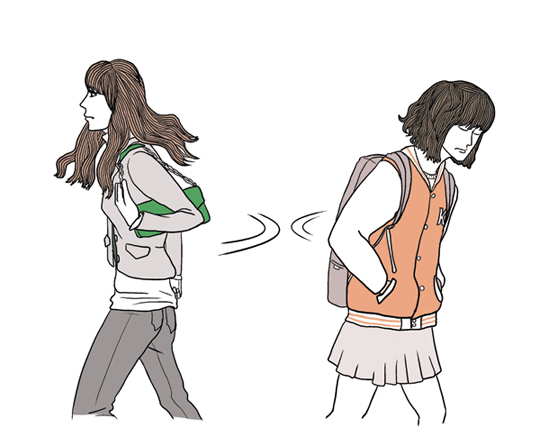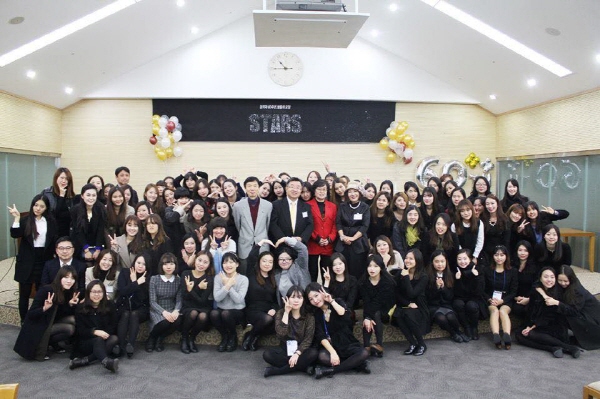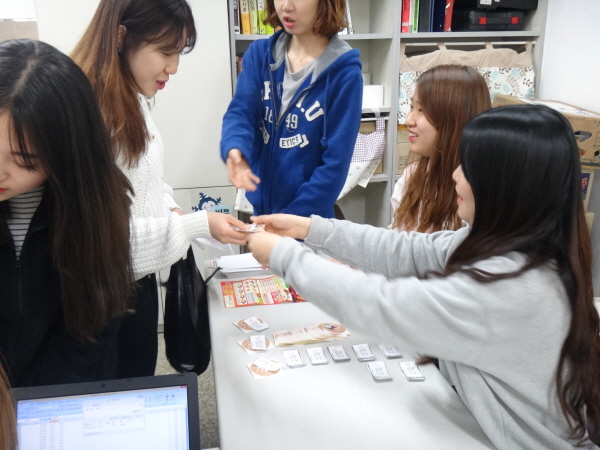
In Korea, people claim the friends you met in high school are the ones that last a life time while friends that you meet at university eventually turn into mere acquaintances. Even though this idea might not be true for all cases, relationship problems are one of the hottest issues on campus. Recently, two problematic situations at university have arisen: the first is being excessively united and the other is being indifferent to one another. Is it possible to harmonize community spirit and individual freedom?

Janus Mirrors University Relationships
In contrast to the image of a university as “Place of Liberal Intelligence,” discipline similar to that used in the military is clearly exhibited at university, especially, among students majoring in music, fine arts, design, and physical education. These majors usually have had a long tradition of following strong hierarchy order. A student majoring in the Faculty of Sports for All Studies ‘14 at Duksung Women’s University recently posted a captured photo of the major’s grouptalk messages and rules on the famous online community website Today’s Humor. The rules included must-keep principles when first year students call or text upper year students and regulations on first year students’ hair style, make up, and dress. Interestingly, this is not only happening in art and physical education majors. Some clubs and autonomous student bodies have created rules in the name of maintaining public discipline and atmosphere. One of the university admission ambassador groups not only has contact manuals including detailed times younger members are allowed to contact senior members and how to respond when answering a phone call from a senior member, it also prohibits certain aspects of one’s appearance like prohibiting dyeing of one’s hair color. Although it is an admission ambassador club that guides high school students when they visit its university, it mandates the colors of its members’ hair. It seems nonsensical, especially since the similar group named Sookmyung Women’s University’s Major Mentor (SUMM), a club that introduces areas of study to high school students doesn’t even have these kinds of rules.
On the other hand, first year students who are referred to as ‘outsiders’ have appeared. According to the career mentoring portal site Incruit, 34.5% of 578 university students consider themselves outsiders. The biggest reason (25.4%) being outsiders is that they do not wish to participate in superfluous department or division events, and the second biggest reason is that they prefer to be alone and free from relationship stress (23.1%). Each younger generation has become more and more individualistic and purpose-oriented, so more students are deciding to become outsiders on their own; in fact, 67.1% of reported outsiders claim they don’t regret their decision.1 However, not all university newcomers wish to be outsiders. Ko Eun, Division of Economics ’13, said, “We rarely gather or create strong relationships with mates who entered the same year or with upper year classmates because the number of students in my major is huge. I sometimes felt a little bit lonely because of that.” Like this, majors that have more than 80~100 students enrollment each year do not seem to show close relationships among students. Also, students over third years are more hesitant to join events held by their faculty rather than second years, who usually charge for management of events, and first years, who are considered main recipients of events. It is because of prejudice that over third-years are not appropriate for faculty events because they have to prepare for graduation and getting a job.

Lose One, Lose Community
One problem with poor development of relationships at university is the unethical discipline that students face; it can lead to deep rooted or inveterate chronic tradition and crime. Due to strict hierarchy regulations and rules, each student starts to “fall in line” with the organizational requirements due to ‘conformity’ and ‘depersonalization.’ When someone belongs to an organization that follows a strict hierarchy like in the military, one is likely to endure the rules because he/she doesn’t want to be centred out. Moreover, the person knows the situation will not last forever but change within a year, so most members decide to endure until they become seniors. Also, many students are reluctant to accuse their oppression, fearing requital. In this situation, students can’t announce problems to the rest of the school or public; therefore, the issues will grow bigger and even turn into a crime. Actually, an incident occurred at a private university located in Gangwon. Upper year students required students on the army reserve to strip down into nothing but underwear and sing a war song for about 10 minutes.2 The university said they will punish the wrongdoers by its rules; however, there are no rules about incidents happened outside the school, so the faculty will charge for the punishment on them. Likewise, most universities have no concrete punishment rules upon this kind of case, the punishment are weakly executed like academic probation. In addition when only the faculty students’ association charges punishment, victims can be suffered more from upper students’ retribution.
Not only are students practicing military-like disciplines, off-campus people are also causing problems; hence, self-governing student communities are weakening. In 2013, students criticized the student association of one of the majors associated with College of Liberal Arts because one first year student voiced a coercive attitude towards the requirement of participating in the ‘College of Liberal Arts Festival.’ At that moment, the department’s student association explained that the ritual was held because of the small number of students in the major and the low number of first year students willing to participate in department events for personal matters. Just as this case illustrates, first-year students’ participation in department events have decreased, so each student association cannot manage events well. As the number of successful events reduces, so does the participation rate, which leads to a vicious circle.
These two problems highlight the diminishing interest in campus activities. Lee Gasub, Division of Child Welfare & Studies ’13, said, “When I was a frosh, I rarely meet upper year classmates, so I had little chance to build relations with them. To fix this, in second semester, I joined a club to make friendships.” Besides this issue, there are students who have left university clubs due to their strict and inexplicable commands. Some students are voluntarily opting out of major gatherings and club meetings because of upper year students’ highhanded attitude even though they may become negatively marked by the community. Lim, a university student in Seoul, told his senior club members that he had decided to withdraw from the club. He said, “The reason I joined this glee club was to sing, but all club members did was being drunk due to orders from more senior members. I got tired of it.”3 Likewise, inexplicable manners are causing students to pull out because they are both physically and mentally exhausted.

Real Change needed for a Real Community
To solve troubles at university, first, each club and autonomous student body has to soften its atmosphere. Groups typically refer to their members either by their membership entrance number—students who create the club are known as 1st members, students who join next are 2nd members, etc.—or by age—the older members are respected regardless of entrance year, etc. Each system has benefits, but some groups are using the membership entrance number to speak to younger students impolitely. Hence, whichever system a group chooses to use, the most important thing is for each member to speak politely to one another. Also, it’s essential that manuals do not hinder one’s personality or privacy; however, as it is difficult to alter a group’s action by voluntary effort, the school should get involved. For example, leadership groups at Sookmyung are associated with school offices; therefore, it’s difficult to request change from members only. Although leadership groups belong to offices, students are self-managing, so the school needs to respect students’ decisions. Furthermore, some universities don’t interfere in the coercive atmospheres because they consider students to be adults, but that attitude is not helpful when serious problems due to irrational demands are made by upper year classmates. Therefore, universities should create disciplinary action to prevent incorrect hierarchy behaviour in groups; for instance, schools might consider giving students disciplinary action like demerit points from scholarships or academic scores and permanent withdrawal from the group.
To solve problems arising from outside influences, effort by student associations are very important. The Department of Political Science & International Relations at Sookmyung Women’s University is famous for its high unity among students. To create a united atmosphere, the association frequently hosts events like special lectures from alumnae and professors, sports gatherings like Footsal, holds group activities like a model assembly session, and eases communication among students through its Facebook page and webzine Jung. Especially, the department has been uploading post on its Facebook page in short intervals compared to other majors; for example, while there are no posts uploaded on Facebook page of the Division of Law since November 24th in 2014, the Department of Political Science & International Relations have uploaded posts constantly, one post in two weeks in average. The Division of Computer Science & Information Technology at Inha University operates three different major study groups to help first year students’ study. Chun Heemin, majoring in Computer Science & Information Technology at Inha University, said, “The study is helpful; with upper classmates, I can finish my assignments and prepare for examinations much easier. As I also want to help my major, I joined the student association voluntarily.”
However, even though students associations work aggressively for students, without first year student participation in those events, the work is useless. Especially, for students, avoiding peer relations at university bring negative consequences. According to recent research, 72% of students who consider themselves outsiders said, being an outsider has influenced themselves negatively; except for the lack of social relations to write on their resumes, more than 60% of students said they cannot but help to become introversive at university. They said that they need to concentrate on their personal dreams, so they endure nervousness, oppression, and so forth.4 Also, to change forced rules and atmospheres of groups, students have to be willing to change it. For example, university students council can suggest rules like prohibit wrongdoers coming to school for a year or giving scholarship merit to students who report cases. Additionally, younger students have to try to stop wrong rules and regulations and not to do the same things when they become seniors. As a result, without students’ change and participation, the school community will never be changed or developed.

Community Spirit, an Unparalleled Value
After graduating from high school and entering university, students meet a variety of people from various backgrounds at university. With each appointment, activity, and event, students become mature. Regrettably, at school, there are always the popular students that everyone wants to be associated with, but there are also people others are reluctant to speak with. Without consideration, participation, and manners, relationships cannot be built up healthily. Benjamin Franklin, who was an American philosopher, scientist, and politician, said, “To be humble to superiors is duty, to equals courtesy, to inferiors nobleness.” What fulfills life is not personal achievement, but the variety of people one meets and the mistakes one makes, the stress one feels, and the joy and life moments that occurred in while one gets relationship with others. Therefore, it’s ridiculous to expect younger students to initiate or avoid meetings with peers and upper year students. To protect the value of relationship, upper year students and those younger than them should respect each other.
1 Oh Hyungil, “One Third of University Students Introduce Themselves “I am an Outsider”,” The Asia Economy Daily, March 4, 2010
2 Lee Donghun, “On Street Wearing Only Underwear…What an Embarrassing University Discipline," JTBC Newsroom, March 24, 2015
3 Moon Hyunwoong, “Highhanded Seniors… The Rebellion of Juniors Occurs,” ChosunMedia, April 11, 2015
4 Park Jihoon, “Half of University students have Experienced Being an Outsider,” Financial News, April 1, 2014


